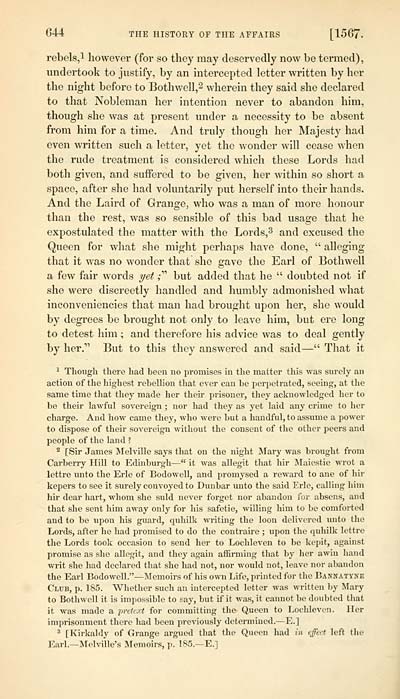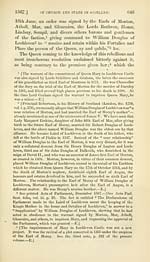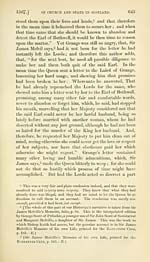Spottiswoode Society > History of the affairs of the Church and State of Scotland from the beginning of the reformation to the year 1568 > Volume 2
(668) Page 644
Download files
Complete book:
Individual page:
Thumbnail gallery: Grid view | List view

C44 THE HISTORY OF THE AFFAIRS [1567.
rebels,! however (for so they may deservedly now be termed),
undertook to justify, by an intercepted letter written by her
the night before to Bothwell,2 wherein they said she declared
to that Nobleman her intention never to abandon him,
though she was at present under a necessity to be absent
from him for a time. And truly though her Majesty had
even written such a letter, yet the wonder will cease when
the rude treatment is considered which these Lords had
both given, and suffered to be given, her within so short a
space, after she had voluntarily put herself into their hands.
And the Laird of Grange, who was a man of more honour
than the rest, was so sensible of this bad usage that he
expostulated the matter with the Lords,^ and excused the
Queen for what she might perhaps have done, " alleging
that it was no wonder that she gave the Earl of Both well
a few fair words yet C but added that he " doubted not if
she were discreetly handled and humbly admonished what
inconveniencies that man had brought upon her, she would
by degrees be brought not only to leave him, but ere long
to detest him ; and therefore his advice was to deal gently
by her." But to this they answered and said — " That it
^ Though there had been no promises in the matter this was surely an
action of the highest rebellion that ever can be perpetrated, seeing, at the
same time that they made her then- prisoner, they acknowledged her to
be their lawful sovereign ; nor had they as yet laid any crime to her
charge. And how came they, who were but a handful, to assume a power
to dispose of their sovereign without the consent of the other peers and
people of the land ?
^ [Sir James Melville says that on the night Mary was brought from
Carberry Hill to Edinburgh — " it was allegit that hir JNIaiestie wrot a
lettre unto the Erie of Bodowell, and promysed a reward to ane of hir
kepers to see it surely convoyed to Dunbar unto the said Erie, calling him
hir dear hart, whom she suld never forget nor abandon for absens, and
that she sent him away only for his safetie, willing him to be comforted
and to be upon his guard, quliilk writmg the loon delivered unto the
Lords, after he had promised to do the contravre ; ujjon the quliilk lettre
the Lords took occasion to send her to Lochleven to be kcpit, against
promise as she allegit, and they again affirming that by her awiu hand
writ she had declared that she had not, nor would not, leave nor abandon
the Earl Bodowell."— Memoirs of his own Life, printed for the Bannatyne
Club, p. 185. Whether such an intercepted letter was written by Mary
to Bothwell it is impossible to say, but if it was, it cannot be doubted that
it was made a 'pretext for committing the Queen to Lochleven. Her
imprisonment there had been previously determined.— E.]
* [Kirkaldy of Grange argued that the Queen had in effect left the
Earl. — Melville's Memoirs, p. 185. — E.]
rebels,! however (for so they may deservedly now be termed),
undertook to justify, by an intercepted letter written by her
the night before to Bothwell,2 wherein they said she declared
to that Nobleman her intention never to abandon him,
though she was at present under a necessity to be absent
from him for a time. And truly though her Majesty had
even written such a letter, yet the wonder will cease when
the rude treatment is considered which these Lords had
both given, and suffered to be given, her within so short a
space, after she had voluntarily put herself into their hands.
And the Laird of Grange, who was a man of more honour
than the rest, was so sensible of this bad usage that he
expostulated the matter with the Lords,^ and excused the
Queen for what she might perhaps have done, " alleging
that it was no wonder that she gave the Earl of Both well
a few fair words yet C but added that he " doubted not if
she were discreetly handled and humbly admonished what
inconveniencies that man had brought upon her, she would
by degrees be brought not only to leave him, but ere long
to detest him ; and therefore his advice was to deal gently
by her." But to this they answered and said — " That it
^ Though there had been no promises in the matter this was surely an
action of the highest rebellion that ever can be perpetrated, seeing, at the
same time that they made her then- prisoner, they acknowledged her to
be their lawful sovereign ; nor had they as yet laid any crime to her
charge. And how came they, who were but a handful, to assume a power
to dispose of their sovereign without the consent of the other peers and
people of the land ?
^ [Sir James Melville says that on the night Mary was brought from
Carberry Hill to Edinburgh — " it was allegit that hir JNIaiestie wrot a
lettre unto the Erie of Bodowell, and promysed a reward to ane of hir
kepers to see it surely convoyed to Dunbar unto the said Erie, calling him
hir dear hart, whom she suld never forget nor abandon for absens, and
that she sent him away only for his safetie, willing him to be comforted
and to be upon his guard, quliilk writmg the loon delivered unto the
Lords, after he had promised to do the contravre ; ujjon the quliilk lettre
the Lords took occasion to send her to Lochleven to be kcpit, against
promise as she allegit, and they again affirming that by her awiu hand
writ she had declared that she had not, nor would not, leave nor abandon
the Earl Bodowell."— Memoirs of his own Life, printed for the Bannatyne
Club, p. 185. Whether such an intercepted letter was written by Mary
to Bothwell it is impossible to say, but if it was, it cannot be doubted that
it was made a 'pretext for committing the Queen to Lochleven. Her
imprisonment there had been previously determined.— E.]
* [Kirkaldy of Grange argued that the Queen had in effect left the
Earl. — Melville's Memoirs, p. 185. — E.]
Set display mode to: Large image | Transcription
Images and transcriptions on this page, including medium image downloads, may be used under the Creative Commons Attribution 4.0 International Licence unless otherwise stated. ![]()
| Permanent URL | https://digital.nls.uk/79612465 |
|---|
| Description | Volume II. |
|---|---|
| Attribution and copyright: |
|

